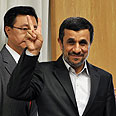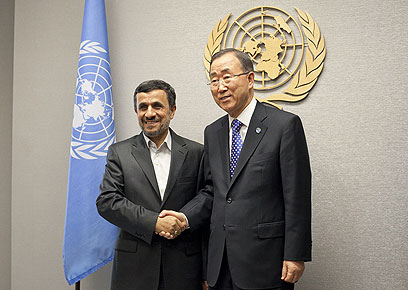
Ahmadinejad: Zionists are adventurous
In interview with CNN, Iranian president stresses his country has a right to defend itself if Israel strikes
WASHINGTON – Iranian President Mahmoud Ahmadinejad addressed the possibility of a conflict with Israel during an interview with CNN. Asked what Iran's response would be if Israel strikes its nuclear facilities, Ahmadinejad said, "Any nation has the right, and will indeed, defend itself."
Meanwhile, Britain, France and Germany have officially called for new European Union sanctions against Iran over its nuclear program, diplomats said Sunday.
Related stories:
- Paper sends Ahmadinejad Jewish 'welcome'
- Ahmadinejad to address UN on Yom Kippur
- Iran: Strike a chance to wipe Israel off map
CNN posted segments of the interview on its website which will be aired in full later on Monday. Asked whether a war with Israel is imminent, the Iranian president replied, "The Zionists are very adventurous, seeking to fabricate things and I think they see themselves at the end of the line."
Ahmadinejad talks to CNN's Piers Morgan
Taking a softer, more vague tone that in the past, he added, "I firmly believe that they seek to create new opportunities for themselves and their adventurous behavior."
Addressing the Israeli concern that Iran is working to obtain a nuclear weapon, Ahmadinejad said, "My question is why should the world manage in such a way that any individual can allow himself to threaten a rich and deeply rooted historical ancient country such as Iran based on an excuse of his own fabrication.
"Another country can say 'I'm guessing that country B is doing X therefore I will attack that country.' Can this be a successful formula for the management of the world?"
Ahmadinejad was interviewed as part of his visit in New York. He is scheduled to address the UN's General Assembly on Wednesday.

Ahmadinejad with Ban Ki-moon (Photo: AFP)
Asked about the anti-Islam film "The innocence of Muslims" that sparked violent riots across the world, he said "Fundamentally, first of all, any action that is provocative, offends the religious thoughts and feelings of any people, we condemn. Likewise, we condemn any type of extremism."
He further added, "of course, offending the Holy Prophet is quite ugly…This is the weakness of and the abuse of freedom, and in many places it is a crime.
"We also believe that this must also be resolved in a humane atmosphere, in a participatory environment, and we do not like anyone losing their lives or being killed for any reason, anywhere in the world."
The Iranian leader was also made to account for his country's persecution of homosexuals, but chose to answer with questions of his own. "I'm sorry. Let me ask you this. Do you believe that anyone is giving birth through homosexuality? Homosexuality ceases procreation. Who has said that if you like or believe in doing something ugly, and others do not accept your behavior, that they're denying your freedom?"
"Proper education must be given ... the education system must be revamped. The political system must be revamped. And these must be also reformed, revamped along the way. But if you, if a group recognizes an ugly behavior or ugly deed as legitimate, you must not expect other countries or other groups to give it the same recognition."
'We are close with Iran's Jews'
When asked how he would feel if one of his children dated a Jew, Ahmadinejad replied, "I would have to see who that Jewish man or woman would be. I see love amongst people as completely acceptable. There are many Jews living in Iran with whom we are very close. There are ... some Muslims that marry into Jewish families or marry Christians."
"I - we have no such problems," he added.
"Of course, I think none of us should represent the whole population of the United States, but we believe that color, religion, native tongue, ethnic background shouldn't create differences or distances between people, nor should it be the sole reason to bring people closer together. It has always been like this."
wa.jpg)
Iranian president at last year's General Assembly (Photo: AP)
It is still unclear what Ahmadinejad will say at the General Assembly but he has already been warned by the UN secretary general to refrain from using incendiary rhetoric.
"The secretary-general drew attention to the potentially harmful consequences of inflammatory rhetoric, counter-rhetoric and threats from various countries in the Middle East," Ban's press office said in a statement.
Meanwhile, European powers are reportedly seeking another round of sanctions against Tehran.
The foreign ministers of Germany, Britain and France wrote to EU foreign policy chief Catherine Ashton last week calling for tougher measures as the showdown with Iran becomes more tense, a European diplomat told AFP on condition of anonymity.
"We think there is still time for a political solution, a diplomatic solution, and this is what we are working for. But we cannot accept nuclear weapons in the hands of Iran," a diplomatic official said.
AFP and Reuters contributed to this report
- Receive Ynetnews updates directly to your desktop










